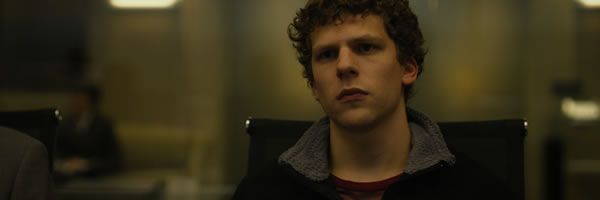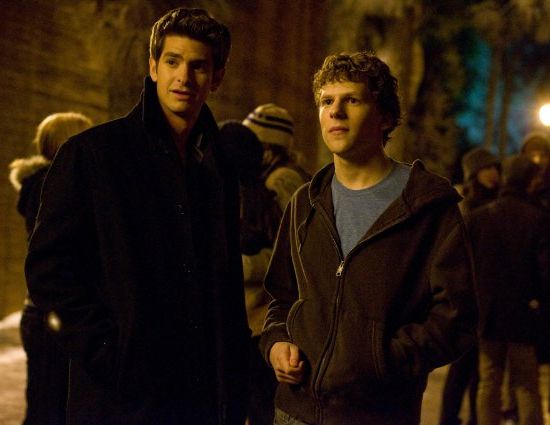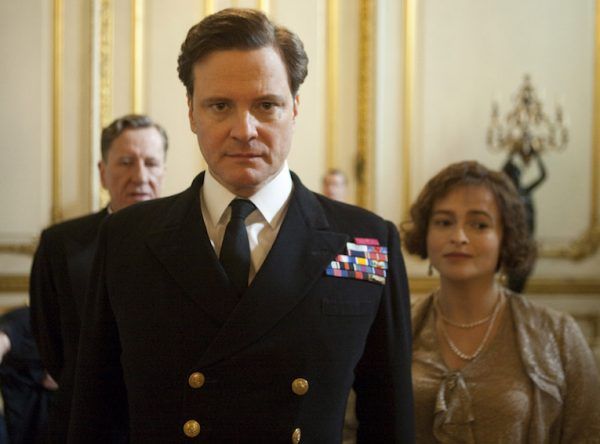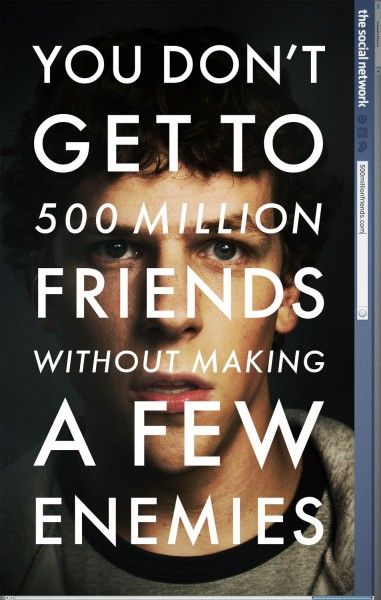Once upon a time, David Fincher was an unlikely awards darling. The filmmaker behind movies like Seven and Fight Club and Zodiac certainly made acclaimed films, but was rarely recognized in awards circles for his work. That changed with 2008’s epic The Curious Case of Benjamin Button, for which Fincher and his collaborators earned significant notice from various awards bodies, including a Best Director Oscar nomination. Suddenly it was as if David Fincher, 20 years into his career of moviemaking, had only just arrived on the radar of awards folks. And given his “arrival” on the awards stage, his next film—2010’s The Social Network—was met with the kind of awards notice reserved for the latest effort from Academy favorite filmmakers like Quentin Tarantino or Alfonso Cuaron. And as it just so happened, that next movie that Fincher made was a downright masterpiece that seemed to appear at just the perfect time.
When Fincher signed on to direct The Social Network, the project was already mired in skepticism. A “Facebook” movie? Who’d want to see that? But Fincher was so impressed by Aaron Sorkin’s screenplay—which portrayed the origin story of Facebook as a compelling tragedy of youth, power, and jealousy—that he agreed to direct the film on the condition that Sony Pictures not force it through a lengthy development period. He wanted to direct Sorkin’s script as-written, and he wanted to do it now.
Months later, with principal photography finished, Fincher knew he only had one shot to make a first impression on audiences. So he and the film’s marketing team crafted a compelling, ominous teaser trailer that was the furthest thing from a “traditional biopic” that you could imagine. Dark, intense, and dripping with intrigue. The film’s official trailer went full-on viral, as an a capella version of “Creep” accompanied rousing footage from the movie. The Social Network hit theaters in October 2010 and was a smash hit, scoring with both critics and audiences.
A perfect marriage of director and screenwriter, and packed with stunning performances from the entire cast—most notably Jesse Eisenberg’s cool insidiousness, Andrew Garfield’s Voice of Reason take on Eduardo, and Justin Timberlake’s parasitic spin on Sean Parker—The Social Network was even at first glance a definitive film about the world in the 21st century. Some of the most powerful men and women on the planet are college dropouts, having created and founded vital technology and companies at an extraordinarily young age. How does that shift power dynamics? What is it like to know you’re the smartest person in the room, but also be underestimated at every turn? How do passionate emotions of your early 20s impact business decisions that have ramifications in the millions of dollars? The Social Network delights in digging into these difficult questions all while being an extremely entertaining watch. Scenes in boardrooms with two people talking have more tension and thrills than entire action sequences in other, far more expensive films. Every single aspect of this movie is operating on another level, due in large part to Fincher’s clear-headed vision for what this “Facebook movie” should be.
And so as The Social Network was raking in the dough, awards season neared, and the film was being hailed as the heavy favorite to win top prize at the Oscars: Best Picture.
And then The King’s Speech happened.
Director Tom Hooper’s staid period drama debuted at the Telluride Film Festival in September 2010 where it earned strong notices from critics, and it was positioned as something of an “underdog” against the flashy The Social Network. Indeed, we can’t talk about The King’s Speech without also talking about The Weinstein Company, which pulled out every awards season trick in the book as the Oscars neared. Harvey Weinstein even played up an entire “controversy” over the film’s use of the word “fuck,” which netted it an R-rating. Weinstein eventually re-cut the film for a “PG-13” version, but the entire ordeal positioned The King’s Speech as a righteous underdog squaring off against the big bad MPAA (although to be fair, the MPAA was wrong on this one).
As for the film itself, The King’s Speech is kind of the antithesis of The Social Network. It tells the story of King George VI overcoming a speech impediment to lead Britain into World War II. It’s a very straightforward, somewhat low-stakes “feel-good” drama that doesn’t particularly have anything to say about the world we live in today other than, “overcoming adversity is hard work.” It also played fast and loose with the truth, whereas The Social Network underwent extreme vetting and drew from depositions to craft its true story.
When the Golden Globes rolled round—one of the major markers on the road to Oscar, regardless of their validity or reputation—The Social Network was victorious. It won Best Score and Screenplay, Fincher won for Directing, and the film itself won Best Motion Picture – Drama, beating out The King’s Speech. And Fincher, again a relative newbie to awards season, acknowledged in his Best Director speech that despite his best efforts, he was kind of enjoying the acclaim for the film:
“I’m personally loathe to acknowledge the kind of wonderful response that this film has received for fear of becoming addicted to it, so suffice it to say… it’s been really nice.”
And so Oscar night arrived. The King’s Speech was gaining steam having won the BAFTA, PGA, and DGA awards, but there was still the thought that The Social Network might pull off the win after all. The night began well enough, with Sorkin winning Best Adapted Screenplay, Trent Reznor and Atticus Ross winning Best Original Score, and in a significant shocker Kirk Baxter and Angus Wall won the Best Film Editing Award. Could it really go all the way?
Alas, when the final two prizes arrived, The Social Network went down for the count. Tom Hooper took home the Best Director Oscar, and The King’s Speech won Best Picture. And I’m still mad about it.
The Oscars are certainly not the be-all, end-all for which films are great and which films are bad, and we’ve seen time and again the “wrong” movie can definitely win Best Picture. Heck, Crash’s victory over Brokeback Mountain was still an open wound when The King’s Speech reigned victorious. But just like that 2007 ceremony, The Social Network losing out to The King’s Speech stands as one of the most egregious whiffs in Oscar history. The Weinstein Company drama was all but forgotten within a year, whereas The Social Network seems to age better and better as Facebook continues to make headlines for all the wrong reasons.
It’s a shame that Jesse Eisenberg wasn’t recognized for one of the most iconic performances of the 21st century. It’s a shame that David Fincher didn’t win the Best Director Oscar for successfully turning “the Facebook movie” into a legitimate masterpiece. And it’s a shame that The Social Network doesn’t get to stand shoulder to shoulder with other exciting 21st century Best Picture winners like Moonlight and Parasite. I can’t say I’m not still upset about the outcome that night, over nine years later. But it is heartening to see where things stand nearly a decade on.
The King’s Speech is all but forgotten, and people are clamoring for a Social Network sequel given the film’s relevance. One director has continued telling challenging, engaging stories. The other director—the “best” director—made Cats.




